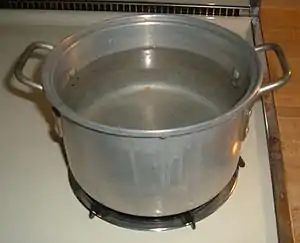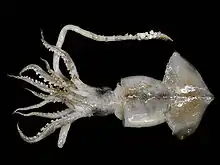pota
Asturian
Etymology
Probably from Old French pot. Further etymology is obscure;[1] perhaps from Proto-Germanic *puttaz (“pot”), from Proto-Indo-European *budn- (“a type of vessel”).
Pronunciation
- IPA(key): /ˈpota/, [ˈpo.t̪a]
Noun
pota f (plural potes)
Related terms
References
- Joan Coromines, José A. Pascual (1983–1991) “bote I”, in Diccionario crítico etimológico castellano e hispánico (in Spanish), Madrid: Gredos
Azerbaijani
| Cyrillic | пота | |
|---|---|---|
| Abjad | پوتا | |
Etymology
From Proto-Turkic *botu.[1] Cognate with Tatar and Bashkir бута (buta), Kyrgyz бото (boto), Kazakh бота (bota).
Pronunciation
- IPA(key): [poˈtɑ]
Audio (file) - Hyphenation: po‧ta
Declension
| Declension of pota | ||||||||
|---|---|---|---|---|---|---|---|---|
| singular | plural | |||||||
| nominative | pota |
potalar | ||||||
| definite accusative | potanı |
potaları | ||||||
| dative | potaya |
potalara | ||||||
| locative | potada |
potalarda | ||||||
| ablative | potadan |
potalardan | ||||||
| definite genitive | potanın |
potaların | ||||||
| Possessive forms of pota | ||||||||
|---|---|---|---|---|---|---|---|---|
| nominative | ||||||||
| singular | plural | |||||||
| mənim (“my”) | potam | potalarım | ||||||
| sənin (“your”) | potan | potaların | ||||||
| onun (“his/her/its”) | potası | potaları | ||||||
| bizim (“our”) | potamız | potalarımız | ||||||
| sizin (“your”) | potanız | potalarınız | ||||||
| onların (“their”) | potası or potaları | potaları | ||||||
| accusative | ||||||||
| singular | plural | |||||||
| mənim (“my”) | potamı | potalarımı | ||||||
| sənin (“your”) | potanı | potalarını | ||||||
| onun (“his/her/its”) | potasını | potalarını | ||||||
| bizim (“our”) | potamızı | potalarımızı | ||||||
| sizin (“your”) | potanızı | potalarınızı | ||||||
| onların (“their”) | potasını or potalarını | potalarını | ||||||
| dative | ||||||||
| singular | plural | |||||||
| mənim (“my”) | potama | potalarıma | ||||||
| sənin (“your”) | potana | potalarına | ||||||
| onun (“his/her/its”) | potasına | potalarına | ||||||
| bizim (“our”) | potamıza | potalarımıza | ||||||
| sizin (“your”) | potanıza | potalarınıza | ||||||
| onların (“their”) | potasına or potalarına | potalarına | ||||||
| locative | ||||||||
| singular | plural | |||||||
| mənim (“my”) | potamda | potalarımda | ||||||
| sənin (“your”) | potanda | potalarında | ||||||
| onun (“his/her/its”) | potasında | potalarında | ||||||
| bizim (“our”) | potamızda | potalarımızda | ||||||
| sizin (“your”) | potanızda | potalarınızda | ||||||
| onların (“their”) | potasında or potalarında | potalarında | ||||||
| ablative | ||||||||
| singular | plural | |||||||
| mənim (“my”) | potamdan | potalarımdan | ||||||
| sənin (“your”) | potandan | potalarından | ||||||
| onun (“his/her/its”) | potasından | potalarından | ||||||
| bizim (“our”) | potamızdan | potalarımızdan | ||||||
| sizin (“your”) | potanızdan | potalarınızdan | ||||||
| onların (“their”) | potasından or potalarından | potalarından | ||||||
| genitive | ||||||||
| singular | plural | |||||||
| mənim (“my”) | potamın | potalarımın | ||||||
| sənin (“your”) | potanın | potalarının | ||||||
| onun (“his/her/its”) | potasının | potalarının | ||||||
| bizim (“our”) | potamızın | potalarımızın | ||||||
| sizin (“your”) | potanızın | potalarınızın | ||||||
| onların (“their”) | potasının or potalarının | potalarının | ||||||
References
- Starostin, Sergei, Dybo, Anna, Mudrak, Oleg (2003) “*botu”, in Etymological dictionary of the Altaic languages (Handbuch der Orientalistik; VIII.8), Leiden, New York, Köln: E.J. Brill
Catalan
Etymology
From Vulgar Latin *pauta. First attested in 1371.
Noun
pota f (plural potes)
Derived terms
- capipota
- pota de cavall
- pota de conill
- pota de gall
- pota de gat
- pota de lleó
- potada
- potera
- potollar
References
- “pota” in Diccionari de la llengua catalana, segona edició, Institut d’Estudis Catalans.
- “pota”, in Gran Diccionari de la Llengua Catalana, Grup Enciclopèdia Catalana, 2024
- “pota” in Diccionari normatiu valencià, Acadèmia Valenciana de la Llengua.
- “pota” in Diccionari català-valencià-balear, Antoni Maria Alcover and Francesc de Borja Moll, 1962.
Galician


Etymology
Probably from Old French pot. Further etymology is obscure;[1] perhaps from Proto-Germanic *puttaz (“pot”), from Proto-Indo-European *budn- (“a type of vessel”).
Pronunciation
- IPA(key): [ˈpɔtɐ]
Noun
pota f (plural potas)
- pot, cooking pot
- Synonym: ola
- díxolle a pota ao caldeiro: "Achégate aló que me luxas!" (proverb)
- the pot told the cauldron: "Go away, you're going to mess me up!" (the pot calling the kettle black)
- flying squid (Todarodes sagittatus)
Related terms
References
- “pota” in Dicionario de Dicionarios da lingua galega, SLI - ILGA 2006–2013.
- “pota” in Tesouro informatizado da lingua galega. Santiago: ILG.
- “pota” in Álvarez, Rosario (coord.): Tesouro do léxico patrimonial galego e portugués, Santiago de Compostela: Instituto da Lingua Galega.
- Joan Coromines, José A. Pascual (1983–1991) “bote I”, in Diccionario crítico etimológico castellano e hispánico (in Spanish), Madrid: Gredos
Icelandic
Etymology
From Old Norse pota (“to put, stick”), from Proto-Germanic *putōną (“to stick, stab, push”). More at put.
Pronunciation
- IPA(key): /ˈpʰɔːta/
- Rhymes: -ɔːta
Conjugation
| infinitive (nafnháttur) |
að pota | ||||
|---|---|---|---|---|---|
| supine (sagnbót) |
potað | ||||
| present participle (lýsingarháttur nútíðar) |
potandi | ||||
| indicative (framsöguháttur) |
subjunctive (viðtengingarháttur) | ||||
| present (nútíð) |
ég pota | við potum | present (nútíð) |
ég poti | við potum |
| þú potar | þið potið | þú potir | þið potið | ||
| hann, hún, það potar | þeir, þær, þau pota | hann, hún, það poti | þeir, þær, þau poti | ||
| past (þátíð) |
ég potaði | við potuðum | past (þátíð) |
ég potaði | við potuðum |
| þú potaðir | þið potuðuð | þú potaðir | þið potuðuð | ||
| hann, hún, það potaði | þeir, þær, þau potuðu | hann, hún, það potaði | þeir, þær, þau potuðu | ||
| imperative (boðháttur) |
pota (þú) | potið (þið) | |||
| Forms with appended personal pronoun | |||||
| potaðu | potiði * | ||||
| * Spoken form, usually not written; in writing, the unappended plural form (optionally followed by the full pronoun) is preferred. | |||||
| infinitive (nafnháttur) |
að potast | ||||
|---|---|---|---|---|---|
| supine (sagnbót) |
potast | ||||
| present participle (lýsingarháttur nútíðar) |
potandist ** ** the mediopassive present participle is extremely rare and normally not used; it is never used attributively or predicatively, only for explicatory subclauses | ||||
| indicative (framsöguháttur) |
subjunctive (viðtengingarháttur) | ||||
| present (nútíð) |
ég potast | við potumst | present (nútíð) |
ég potist | við potumst |
| þú potast | þið potist | þú potist | þið potist | ||
| hann, hún, það potast | þeir, þær, þau potast | hann, hún, það potist | þeir, þær, þau potist | ||
| past (þátíð) |
ég potaðist | við potuðumst | past (þátíð) |
ég potaðist | við potuðumst |
| þú potaðist | þið potuðust | þú potaðist | þið potuðust | ||
| hann, hún, það potaðist | þeir, þær, þau potuðust | hann, hún, það potaðist | þeir, þær, þau potuðust | ||
| imperative (boðháttur) |
potast (þú) | potist (þið) | |||
| Forms with appended personal pronoun | |||||
| potastu | potisti * | ||||
| * Spoken form, usually not written; in writing, the unappended plural form (optionally followed by the full pronoun) is preferred. | |||||
| strong declension (sterk beyging) |
singular (eintala) | plural (fleirtala) | |||||
|---|---|---|---|---|---|---|---|
| masculine (karlkyn) |
feminine (kvenkyn) |
neuter (hvorugkyn) |
masculine (karlkyn) |
feminine (kvenkyn) |
neuter (hvorugkyn) | ||
| nominative (nefnifall) |
potaður | potuð | potað | potaðir | potaðar | potuð | |
| accusative (þolfall) |
potaðan | potaða | potað | potaða | potaðar | potuð | |
| dative (þágufall) |
potuðum | potaðri | potuðu | potuðum | potuðum | potuðum | |
| genitive (eignarfall) |
potaðs | potaðrar | potaðs | potaðra | potaðra | potaðra | |
| weak declension (veik beyging) |
singular (eintala) | plural (fleirtala) | |||||
| masculine (karlkyn) |
feminine (kvenkyn) |
neuter (hvorugkyn) |
masculine (karlkyn) |
feminine (kvenkyn) |
neuter (hvorugkyn) | ||
| nominative (nefnifall) |
potaði | potaða | potaða | potuðu | potuðu | potuðu | |
| accusative (þolfall) |
potaða | potuðu | potaða | potuðu | potuðu | potuðu | |
| dative (þágufall) |
potaða | potuðu | potaða | potuðu | potuðu | potuðu | |
| genitive (eignarfall) |
potaða | potuðu | potaða | potuðu | potuðu | potuðu | |
Irish
Etymology
Borrowed from Middle English potte, from Old English pott (“a pot”), from Proto-Germanic *puttaz (“pot”), from Proto-Indo-European *budn- (“a type of vessel”).
Pronunciation
- IPA(key): /ˈpˠɔt̪ˠə/
Noun
Declension
Derived terms
Mutation
| Irish mutation | ||
|---|---|---|
| Radical | Lenition | Eclipsis |
| pota | phota | bpota |
| Note: Some of these forms may be hypothetical. Not every possible mutated form of every word actually occurs. | ||
Further reading
- Ó Dónaill, Niall (1977) “pota”, in Foclóir Gaeilge–Béarla, Dublin: An Gúm, →ISBN
- G. Toner, M. Ní Mhaonaigh, S. Arbuthnot, D. Wodtko, M.-L. Theuerkauf, editors (2019), “pota”, in eDIL: Electronic Dictionary of the Irish Language
- Entries containing “pota” in English-Irish Dictionary, An Gúm, 1959, by Tomás de Bhaldraithe.
- Entries containing “pota” in New English-Irish Dictionary by Foras na Gaeilge.
Italian
Verb
pota
- inflection of potare:
- third-person singular present indicative
- second-person singular imperative
Kapampangan
Pronunciation
- IPA(key): /ˈpotə/, [ˈpoː.tə]
- Hyphenation: po‧ta
Kari'na
Etymology
From Proto-Cariban *pota; compare Apalaí pota, Wayana pota, Waiwai pota, Pemon pota, Yao (South America) hopataly.
References
- Courtz, Hendrik (2008) A Carib grammar and dictionary, Toronto: Magoria Books, →ISBN, page 351
- Ahlbrinck, Willem (1931) “pota”, in Encyclopaedie der Karaïben, Amsterdam: Koninklijke Akademie van Wetenschappen, page 386; republished as Willem Ahlbrinck, Doude van Herwijnen, transl., L'Encyclopédie des Caraïbes, Paris, 1956, page 377
Latin
Maori
Mbyá Guaraní
Navarro-Aragonese
Etymology
Inherited from Vulgar Latin *pauta. Attested in the fifteenth century.
Pronunciation
- IPA(key): /ˈpota/
References
- Walther von Wartburg (1928–2002) “*pauta”, in Französisches Etymologisches Wörterbuch (in German), volumes 8: Patavia–Pix, page 77
Portuguese
Pronunciation
- IPA(key): /ˈpɔ.tɐ/
- Rhymes: -ɔtɐ
- Hyphenation: po‧ta
Rapa Nui

Etymology
From Proto-Polynesian *pota. Cognates include Samoan pota and Maori pota.
Pronunciation
- IPA(key): /ˈpo.ta/
- Hyphenation: po‧ta
Spanish
Pronunciation
- IPA(key): /ˈpota/ [ˈpo.t̪a]
- Rhymes: -ota
- Syllabification: po‧ta
Derived terms
Verb
pota
- inflection of potar:
- third-person singular present indicative
- second-person singular imperative
Further reading
- “pota”, in Diccionario de la lengua española, Vigésima tercera edición, Real Academia Española, 2014
Swahili
Pronunciation
Audio (Kenya) (file)
Conjugation
| Conjugation of -pota | |||||||||||||||||||||||||||||||||||||||||||||||||||||||||||||||||||||
|---|---|---|---|---|---|---|---|---|---|---|---|---|---|---|---|---|---|---|---|---|---|---|---|---|---|---|---|---|---|---|---|---|---|---|---|---|---|---|---|---|---|---|---|---|---|---|---|---|---|---|---|---|---|---|---|---|---|---|---|---|---|---|---|---|---|---|---|---|---|
| |||||||||||||||||||||||||||||||||||||||||||||||||||||||||||||||||||||
| Infinitives | |||||||||||||||||||||||||||||||||||||||||||||||||||||||||||||||||||||
| |||||||||||||||||||||||||||||||||||||||||||||||||||||||||||||||||||||
| Imperatives | |||||||||||||||||||||||||||||||||||||||||||||||||||||||||||||||||||||
| |||||||||||||||||||||||||||||||||||||||||||||||||||||||||||||||||||||
| Tensed forms | |||||||||||||||||||||||||||||||||||||||||||||||||||||||||||||||||||||
| |||||||||||||||||||||||||||||||||||||||||||||||||||||||||||||||||||||
| |||||||||||||||||||||||||||||||||||||||||||||||||||||||||||||||||||||
| |||||||||||||||||||||||||||||||||||||||||||||||||||||||||||||||||||||
| |||||||||||||||||||||||||||||||||||||||||||||||||||||||||||||||||||||
| |||||||||||||||||||||||||||||||||||||||||||||||||||||||||||||||||||||
| |||||||||||||||||||||||||||||||||||||||||||||||||||||||||||||||||||||
| |||||||||||||||||||||||||||||||||||||||||||||||||||||||||||||||||||||
| |||||||||||||||||||||||||||||||||||||||||||||||||||||||||||||||||||||
| |||||||||||||||||||||||||||||||||||||||||||||||||||||||||||||||||||||
| |||||||||||||||||||||||||||||||||||||||||||||||||||||||||||||||||||||
| Some forms not commonly seen in modern Standard Swahili are absent from the table. See Appendix:Swahili verbs for more information. | |||||||||||||||||||||||||||||||||||||||||||||||||||||||||||||||||||||